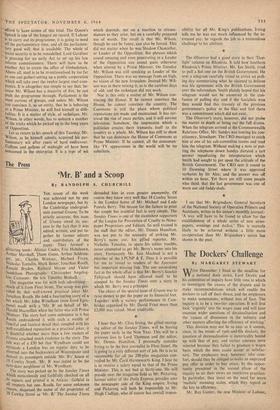The Press
'Mr. B' and a Scoop
By RANDOLPH S. CHURCHILL
The magazine was fat with lush advertising— much of it from Fleet Street. The scoop was pro- vided by that well-known practical joker Mr. Jonathan Routh. He told a fascinating story of a bet which Mr. John Wyndham (now Lord Egre- mont) made with a 'Mr. B' on behalf of Mr. Harold Macmillan when the latter was still Prime Minister. The story had some substance to it but Routh embroidered it with such a wealth of fanciful and farcical detail that, coupled with his Well-established reputation as a practical joker, it IS doubtful whether more than a few readers of Crania attached much credence to the story. The tale was of a £50 bet that Wyndham could not Persuade a London bus on regular duty to be diverted into the backwaters of Westminster and deposit its passengers outside 'Mr. B's' house at 18 Cowley Street. 'Mr. B' was stated to be the next-door neighbour of Mr. Wyndham. The story was picked up by the Sunday Times Vv. limb meticulously and faithfully checked on all Its aspects and printed it in Atticus—faithful in all respects but one. Routh, for some unknown reason, disguised the name of the proprietor of 18 Cowley Street as 'Mr. B.' The Sunday Times
shrouded him in even greater anonymity. Of course they knew very well that 18 Cowley Street is the London home of Mr. Michael and Lady Pamela Berry. The reason for the failure to print this simple but essential fact is very simple. The Sunday Times is one of the staunchest supporters of the League for Prevention of Cruelty to News- paper Proprietors and Editors. So well trained is the staff that the editor, Mr. Dennis Hamilton, was not put to the necessity of striking Mr. Berry's name out; his gifted reporter, Mr. Nicholas Tomalin, to spare his editor trouble, never attempted to get Mr. Berry's name into his story. Fortunately Mr. lain Macleod is not a niember of the LPCNP & E. Thus it is possible for me to reveal to readers of the Spectator this important missing link. The one astonishing fact in the whole affair is that Mr. Berry's Sunday Telegraph should have allowed itself to be scooped by the Sunday Times over a story in which Mr. Berry was a principal.
The object of the special issue of Granta was to raise money to put the paper on its financial feet. Together with a variety performance in Cam- bridge organised by Mr. David Frost more than £2,000 was raised. Most creditable.
I hear that Mr. Clive Irving, the gifted manag- ing editor of the Sunday Times, will be leaving the paper early in the New Year. This will be a grievous loss to Lord Thomson and the editor, Mr. Dennis Hamilton. I personally consider Irving to be the best journalist in Fleet Street. He is going to a very different sort of job. He is to be responsible for all the 200-plus magazines con- trolled by Mr. Cecil Harmsworth King. I hear he is to receive a salary equal to that of the Prime Minister. This is not bad at thirty-one. He will preside over the magazine field as Mr. Pickering, former' editor of the Daily Express, presides over the newspaper side of the King empire. Irving and Pickering will both be responsible to Mr. Hugh Cudlipp, who of course has overall respon-
sibility for all Mr. King's publications. Irving tells me he was not much influenced by the in- creased pay; he regards the job as a tremendous challenge to his abilities.
The Observer had a gOod story in their 'Day- light' column on Rhodesia. It told how Southern Rhodesia's Prime Minister, Mr. Ian Smith, tried to pull a hot one on the British Government. He sent a telegram carefully timed to arrive on poll- ing day summarising what he claimed to believe was his agreement with the British Government over the referendum. Smith plainly hoped that his telegram would not be answered in the con- fusion of polling day and if the Socialists won they would find this travesty of the previous government's policy in the files and feel there was a commitment which did not exist.
The Observer's story, however, did not probe the matter in depth or bring out the full drama. When the telegram arrived at the Commonwealth Relations Office, Mr. Sandys was touring his con- stituency, Streatham. The CRO managed to catch him at one of his sub-committee rooms and read him the telegram. Without making a note or put- ting the telephone down Sandys dictated a tart answer repudiating the interpretation which Smith had sought to put upon the attitude of the British Government. The CRO sent it round to 10 Downing Street where it was approved verbatim by Sir Alec; and the answer was off within an hour. Yet there are still some people who think that the last government was one of worn out old fuddy-duds.
I see that Mr. Briginshaw, General Secretary of the National Society of Operative Printers and Assistants, writes in his union's monthly journal: 'A way will have to be found to allow for the establishment of a whole series of new news- papers, evenings and dailies.' This is scarcely likely to be achieved without a little more co-operation than Mr. Briginshaw's union has shown in the past.
































 Previous page
Previous page